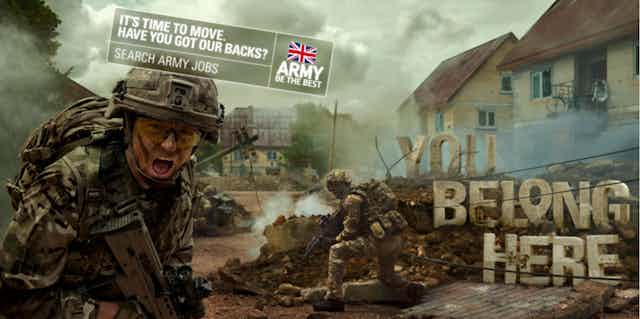Anyone with teenagers in the house might have heard sounds from bedrooms that give the impression that a raid or heist is being orchestrated by a gang. In reality, they are probably fighting a war on their games console against other armies that might be made up of other kids from their street. Of course, it might just as easily be a foe from anywhere on the planet.
This artificial environment, perhaps best exemplified at the moment by gaming company Roblox has overtaken the movies and music industries enjoyed by previous generations. So you can see why the army might want to attract attention for military games through recruitment videos that resemble the games young people play.
But does the UK armed forces’ new Fortnite-style recruitment video reveal anything more on the changing character of war in the 21st century?
One of the things that could be driving the creation of futuristic and exciting new recruitment videos is the need to grab the attention of a generation who might otherwise not be particularly interested in a military career.
After the withdrawal from Afghanistan, teenagers or young adults might consider foreign policy decisions taken by the United States and its allies to have led to disastrous “unnecessary wars” that ended up producing more chaos around the world than greater security. That is similar to how many young people felt after the Vietnam war.
On a more mundane level, young people in the UK might hear about the poor living conditions in the military and problems with kit and supplies. It might not look like a career for the best and the brightest who might be more interested in becoming a social media influencer or the next Elon Musk.
Meanwhile, if you are interested in joining up, why not experience the danger at a safe distance, in your bedroom, in the Roblox world?
In a more complex multicultural world where young people might have friends and family outside of the UK – and outside of the Euro-American world – the military career might need an eye-catching advertising campaign to make it more appealing. And it might be that the values and world-views of our current teenagers and 20-somethings are different from previous generations.
Battlefields of the future
There might be another reason for using futuristic video games as a way of getting the attention of this generation of gamers, however. War is changing. There are new tactics of war where the “information war” is becoming a vital part of conflicts in the 21st century. We are seeing this both in Ukraine and Gaza where claim and counterclaim are central to the way the conflicts are being fought by all sides.
The terrains – or domains – of conflict and competition are changing. What type of terrains or domains will an 18 year-old in 2024 be tasked with intervening in by the time they have more senior roles? There is a concern that warfare will soon involve technologies that are currently the stuff of science fiction. Future warfighters might be “teamed with AI tools and partners”.
Domains such as space will be increasingly significant in the decades ahead. States will confront ethical and strategic challenges unlike anything confronted in history. Societies and armies will risk being deceived in the information-rich battle spaces of the digital age.
Military planners will need to find creative ways to deceive the enemy using the tools of the digital age. Deception – and the possibility of getting your enemy to make mistakes – has been viewed as a vital element in war, going back to the writings of the Chinese philosopher Sun Tzu, as far back as the 5th century BC. A generation brought up on complex and innovative games might be well suited to the complexity of the future battlespace.
The use of games in the military is now about much more than advertising. There seems to be a renewed interest across Nato members in exploring how games could be used to prepare policymakers and military commanders for complex conflicts and global challenges. I was involved in the development of a role-playing game inspired by Dungeons and Dragons. I wrote about the experience in this article.
Developed by a group of “military designers” based in Toronto, the game sets out to encourage thinkers to reflect on how they respond to the kinds of messy and complex situations they might confront in their careers. The game is being used across Nato members and new games are in development.
Next-generation warfare
Gaming seems to be have caught the attention of states and organisations – both as a way of appealing to new generations and as a way of preparing young people for the complexity and uncertainty of future wars. I explore this topic in my book Theorising Future Conflict: War Out to 2049.
So, this Fortnite-inspired video might reflect much more than a fancy social media campaign. The video reflects the way that militaries are looking for new skills.
We live in a time where young people can experience war increasingly as a video game through the clips filmed on phones or GoPro video cameras in Gaza, Israel or Ukraine.
It remains to be seen how the visceral and brutal insights into the reality of war and violence will shape the views of the young people of liberal democracies considering a career in the military in a world that feels more dangerous than it ever has.

